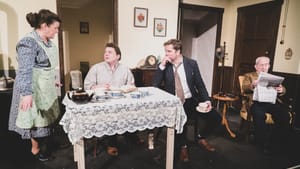Stay in the Loop
BSR publishes on a weekly schedule, with an email newsletter every Wednesday and Thursday morning. There’s no paywall, and subscribing is always free.
The sins of our father
Irish Heritage Theatre presents Hugh Leonard’s ‘Da’

I wear green on St. Patrick’s Day, even though I don’t do anything else to mark the day. That’s because I live in the fear every March 17 that my father—who lives more than 2,000 miles away—will somehow pop up around a corner and pinch me for not marking my Irish heritage. (My dad has never been to Ireland, but that’s beside the point.) So it seemed only fitting that, in the days leading up to Americans’ favorite excuse to get drunk in the month of March—excuse me, I mean the celebration of Ireland’s patron saint—I would find myself watching Da, a play about grownup children and fathers, at Irish Heritage Theatre.
Haunted by memories
At the beginning of Da, we meet Charlie (Daniel McGlaughlin), recently returned to Ireland for his father’s funeral, and Oliver (Lee Stover), a school friend whom Charlie hasn’t seen in at least a decade. It seems at first that we’ll be getting a relatively straightforward play—man comes home for funeral and is reacquainted with his old friends, his hometown, etc.—until Charlie’s father, Da himself (John Cannon), enters the scene. Though Oliver can’t see Da, Charlie clearly can. And after Oliver leaves, Charlie continues to be shadowed by the ghost of his father, who not only talks to Charlie but can hold and touch physical objects in the house.
This might be a simple haunting, until Da invokes Charlie’s late mother (Mary Pat Walsh), who in turn calls for a younger Charlie (Oliver Donahue), who—as the elder Charlie eventually notes—kind of counts as dead, too, because Charlie is now a very different person. From this point forward, the action of the play bounces between flashbacks, conversation with Charlie’s ghosts, and direct address to the audience that serves to fill in more context from his past. The play moves backward and forward in time fluidly, the ghosts sometimes interacting with Charlie and sometimes with one another while Charlie watches. It’s sometimes a bit disconcerting but never confusing, and serves to paint a fuller picture of Charlie’s family, for all their flaws.
A celebrated script
Hugh Leonard’s Da was the first Irish play to win a Tony Award for Best Play (1978), and for good reason. The script is bittersweet, tightly woven, and compelling. The images it tackles are simultaneously universal (familial estrangement, aging parents) and uniquely Irish (referring frequently to what was happening in Ireland in the early part of the 20th century). It’s full of Irish idioms, but none so indecipherable as to keep the audience from following the action of the show.

The script also requires all of its performers to deliver their lines in an Irish brogue, a challenge the cast met handily (perhaps at times even too much so—some lines were harder to make out than others, disappearing into the rafters of Plays & Players). Tasked with most of the talking, McGlaughlin never lets the accent slip and, as his parents, Cannon and Walsh also keep the audience grounded in the world of Da with pitch-perfect accents.
Parents today
But Da isn’t just about accents and flashbacks. It’s the story of a son and how he’s able to cope with his memories now that his mostly estranged father is dead. It’s about the relief we sometimes feel when a loved one dies and we no longer have to be responsible for their financial or emotional needs. It’s about how the people we idolize in our youth so often disappoint us when we reach adulthood.
Though the events of Da are set 50 years ago, the father-son relationship in Da feels remarkably modern. At a time when so many children are estranged from their parents due to the current political climate, a story about the turmoil a person can feel when looking back over their relationships with their parents resonates in a way it might not have even five years ago. Kudos to director Peggy Mecham for drawing such compelling, engaging, and relatable performances out of her cast.
Go see the play. And maybe go call your folks, too.
What, When, Where
Da. By Hugh Leonard. Directed by Peggy Mecham. Through March 23, 2019, at Plays & Players Theatre, 1714 Delancey Street, Philadelphia. irishheritagetheatre.org.
Plays & Players is not an ADA-compliant venue.
Sign up for our newsletter
All of the week's new articles, all in one place. Sign up for the free weekly BSR newsletters, and don't miss a conversation.

 Jillian Ashley Blair Ivey
Jillian Ashley Blair Ivey